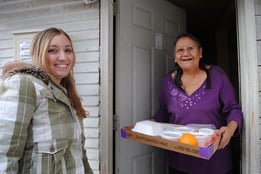 Increasing Demand…
Increasing Demand…
Meals On Wheels, which delivers meals to the elderly in their homes and at senior centers, has seen demand for their services explode since the pandemic started.
- When COVID-19 hit, a staggering 89% of Meals On Wheels programs reported increased demand for meals, practically overnight.
- 79% of Meals On Wheels programs saw their demand double.
- Older adults who were mobile prior to the pandemic can no longer safely go to stores to buy their own food, and many do not have loved ones close by to help them through this time. Add this to the roster of seniors who were already homebound.
Meets Decreasing Supply
At the same time, Meals On Wheels has lost about half of its two million volunteers. Three-quarters of them were over age 55, putting them into a high-risk category for the virus. Making up for that sudden loss has not been easy but, for Meals on Wheels, shutting down and letting seniors go hungry was simply unfathomable. Rather, programs across the country got creative and came up with new ways to meet the needs of their clients while practicing safe physical distancing and sanitation practices.
Where There’s a Will – There’s a Way
Meals on Wheels programs across the country persisted by adjusting their typical operating procedures to meet the dramatic increase in demand while, at the same time, losing most of their volunteers and having their service model radically altered in order to comply with CDC guidelines.
- While the Meals On Wheels model typically includes a friendly, in-person visit, their approach has been modified to accommodate social distancing requirements. Volunteers now leave food at their clients’ doors, give a knock and step back at least six feet to wait for the senior to answer.
- The Meals On Wheels program in Welch, WV, the city with the oldest population in the country, saw an increase in demand that reached far beyond their traditional service area. They quickly scaled up to meet this expanded need by hiring paid drivers to deliver more meals.
- Many local programs have transitioned from daily meal deliveries to weekly or biweekly. By providing a supply of shelf-stable or frozen meals instead of delivering fresh, hot meals, seniors can count on a continual source of food while also minimizing their exposure to others.
- A local program in Cincinnati, Ohio is supplying toothpaste, toothbrushes, hand sanitizer and soap to reduce the spread of illness and keep seniors safe.
- A team of volunteers in Thousand Oaks, California shops for local seniors, delivering groceries and pantry items to Meals On Wheels clients alongside their meals.
- Meals On Wheels Mesa County of Mesa County, CO, is serving food curbside for pick-up out of a community restaurant two times a week for their Palisades, CO, clients. Additional meals are being stored in donated freezer space at a local convention center.
- Meals On Wheels America has established the Meals On Wheels COVID-19 Response Fund that has already distributed more than $25 million to local Meals On Wheels programs in the communities that need it most.
Never Give Up
This deadly pandemic has lingered on so long that it has tested the good-will and resilience of the American people. The “never say die” attitude of the people at Meals on Wheels is a much-needed inspiration to all of us. Thank you for showing us the way and giving us the will to defeat this horrible virus in the months to come. The end is finally in sight.

